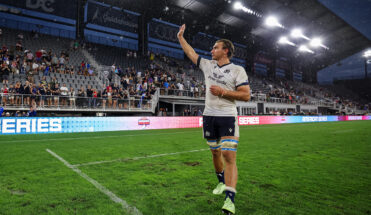IN FOCUS: Mike Biggar’s 500 Steps for the NHS
Guest writer Donald Walker speaks to Mike Biggar about his efforts to raise money for NHS Charities Together.
Rugby supporters of a certain age will have felt deep emotions if they have managed to catch up with the recent exploits of former Scotland captain Mike Biggar, who is raising funds for NHS Charities Together.
This stalwart of the national side in the 1970s was inspired by the sight of Captain Tom Moore, the 99-year-old war veteran who took on the challenge of completing 100 laps of his garden before his 100th birthday, to raise money for the same charity as it supports NHS staff and volunteers who are caring for Covid-19 patients. At the time of writing, the army veteran who has won the heart of the nation through his positivity has raised £29 million, from an initial target of just £1000.
However, Mike’s challenge is arguably much harder. His century target is measured not in laps, but in steps. The sight of the wheelchair-bound rugby hero trying to manage just a single step in the video clips available on social media, including the Scottish Rugby website – as well as an item on BBC Breakfast – is both heartbreaking and uplifting, not just for those who remember the flanker careering courageously into a growling ambush of opponents, but also for anyone seeing him for the first time, gripping on to parallel bars for dear life, while trying to convince a reluctant foot to move in front of the other – without falling and risking further damage to a body that has already been bowed by misfortune, but remains unbeaten.
Personally, I found the sight of Mike taking on his challenge to be a shock. I lost touch with him around 20 years ago, having first met him in early 1994, just 18 months after a horrific car crash which left him with serious brain damage. He was in a coma for five weeks and then spent just under a year recovering and rehabilitating in hospital. When he emerged against the odds, there was joy over his recovery, but the damage inflicted was significant. There was recovery, initially, but the challenges would be enormous and the risk of further injury ever-present. Since that meeting with him, a series of falls and bangs to the head caused by his reduced mobility have turned his recovery into decline.
My first image of Mike 26 years ago, relying on walking sticks as he moved unsteadily towards me at Cheltenham railway station, was hard enough to come to terms with when compared to my childhood memories of an international thoroughbred charging around the paddock. But he was fighting back, as further evidenced when we headed to his car and he drove us to his office, the law firm where he was a partner and where he was back at work on a probationary basis (ultimately, a return to work would prove to be too much for him).
And although he was diminished, there were elements of his character which were as strong as ever: his courage, his determination, his positivity, and his sense of humour. Difficult conversations between us were to follow, as I interviewed him for Scottish Rugby magazine and heard a story that had not been told outside the immediate family up to that point, and yet there was plenty of laughter as well. It didn’t take long to realise I had been lucky enough to meet a quite remarkable individual.
Later, I would bump into him again at Murrayfield, where he was a guest of the Scottish Rugby Union at internationals, and his situation became better known. There were tribute dinners at Twickenham and then at Murrayfield, where rugby greats turned out to raise funds that would help Mike’s rehabilitation, and in an almost fairy tale event, he married the friend who had helped nurse him back from the brink of death, Ali Mead. There was more to come. In October 1997, Mike and Ali had a son Tom (now a strapping 6ft 5in rugby player at Swansea University), a brother for Mike’s son George from his previous marriage. After what Mike had been through, this was the most unexpected of happy consequences.
But it could never be a truly happy ending, because the effects of the car crash have been with Mike each day since then, and every one of those days has been a battle. There have been more dark days, such as just a few weeks ago when a kidney infection caused an emergency admission to hospital and a deterioration that saw the family gather for an urgent video call to speak to Mike, not knowing if they would ever see him again.
Yet just a short time later he was back home, and as determined as ever to get on with life. The sight of Captain Tom on TV, clocking up the laps on his walking frame, led to a sequence of events that brought the unexpected sight of Mike popping up on my Twitter feed, then just as unexpectedly, my phone ringing the other night … and Mike on the other end, wanting to speak to me after finding out I had been in touch with his son George to enquire about how the 100-step challenge was going.
A quick word with his wife Ali revealed that Mike was having his best day since getting out of hospital and returning home to the Cotswolds (Mike’s adopted home, having originally been from St Boswells in the Borders), and that this was a good time to talk to him. Not only that, but after managing a total of just four or five steps during his first two weeks out of hospital, Mike had managed 25 on that single day. The challenge has now been pushed out from 100 steps to 500, and the cash target pushed up to £50,000.
“Captain Tom prompted me, and I thought that if he can do it, so can I,” said Mike, brimming with enthusiasm. “I just needed to pull the finger out and get on with it. My mother always told me to stick in, and get on with it. You get bugger-all in life for doing nothing.
“I am flattered with all the interest, and my old rugby mates are far too generous when they talk about me. I don’t deserve all this attention. So many other guys go through more than this.
“And I am lucky to have a wonderful wife who helps me. Even if she has questionable choice in husbands.”
I pick up on his sense of humour, which remains intact despite all he has gone through.
“One thing that has got me through all these years of rehabilitation is a good sense of humour,” replies Mike, going on to further demonstrate his point when explaining his determination.
“John Spencer, the England internationalist, was at school with me. We both went on to Cambridge, and I found myself in a room with some very good rugby players. I said to John that I shouldn’t be there, because all the other guys had got three As in their A-levels, and I would have to work so hard to keep up with them that I wouldn’t have time to play rugby. John took me aside and said: ‘Mike, never forget BBB. Bull***. Baffles. Brains. You can do it. Get on with it.’ And that’s what I have always done.”
The morning after receiving Mike’s call, I had a follow-up call with his eldest son, George. Two years ago, George was a member of The Four Oarsmen team who rowed 3,000 nautical miles across the world’s second largest ocean as part of the Atlantic Challenge, breaking the world record for the crossing in the process. That in itself is a quite a back story, but it is a story from earlier in his life that I ask him about.
When Mike was in a coma after his car crash, family friends and work colleagues prayed every day that there would be a sign of life from the motionless figure on the hospital bed. A friend compiled a recording of highlights from international rugby matches that Mike had played in, hoping he would react to the sound of the commentary. It didn’t work. Then, Mike’s father tried another way. He recorded the sound of his grandson, eight-year-old George, reading a poem. When the tape was played at Mike’s bedside, he reacted for the first time. Those present let out a cheer; miraculously, the senses were working.

Now age 34, George admits he has no memory of his father from before the accident, when Dad was able to run around in the garden with his adored young son.
“When I was ten years old, Dad was able to move around at quite a pace, even though he was on sticks,” recalls George. “Not now. His recovery has sadly turned into decline; this is terribly upsetting but you just have to take it for what it is and get on with it. I’m so proud of him, but at the same time I can’t help feeling sorry for him.
“Luckily he has Ali beside him, who is an incredible human being. She takes on more than I could ever contemplate, every day of the year. She’s also a vet, which is handy, because Dad’s like an old bull!
“But day-to-day there is not a lot of excitement in his life because of his condition. If you look at it from the outside, every day is a nightmare for him. But Dad rises above it. He always has done. His positivity and unerring, jovial outlook have never left him. It’s baffling how he can maintain such a mind set in spite of the compromises and challenges he faces, but that’s what keeps him going.
“He has had low sodium levels since the kidney infection, which can limit your ability to make sense of things. But I’m sure he was lucid when he spoke to you on the phone, because he has always had an ability to raise his game, and perform. It must have been the same when he was a rugby player.
“The feedback he is getting as he attempts the steps challenge is extraordinary. As well as social media, there are his friends from school at Sedbergh, university, London Scottish, and kids who Dad mucked in to help coach at London Scottish during his playing days. Many of his old opponents have sponsored him too during his steps challenge. Equally, there are complete strangers, who grew up watching Dad putting his body on the line for Scottish rugby, and want to reach out to support him.”
Before George and his team-mates embarked on his Atlantic challenge, Mike wrote them a letter, which was laminated and to be read when the trip ran into trouble, or when spirits were low. It was effectively a half-time team-talk, encouraging them not to forget what they had achieved already – “achievement enables” is one of Mike’s mottos – and to press on to the finish line to fulfil their mission.
“As my first Scotland captain Ian McLauchlan taught us,” wrote Mike, “the two saddest words in rugby are ‘if’ and ‘only’. If only I’d made that tackle, if only I’d gone that extra yard. I realised I would get only one opportunity to fulfil my potential. What is true of rugby is also true of rowing the Atlantic, so dig that bit deeper and finish the job.
“Each of us gets one chance, and one chance only to deal with any challenge whether it be an opportunity or a threat, and you will need the skill and courage to recognise which it is, and to take it.”
If ever such a hard-learned philosophy for life had enduring relevance, it must be now. Mike Biggar, rugby hero and an inspiration to so many others, faces another daunting challenge head-on, and sees only opportunity.
To donate to Mike’s 500 Steps for the NHS, go to https://www.justgiving.com/fundraising/mike-biggar
By Donald Walker
Related Fanzone
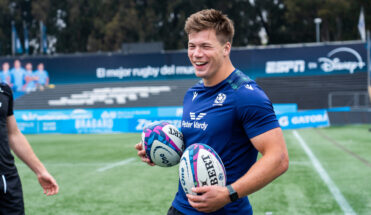
Preview: Uruguay v Scotland
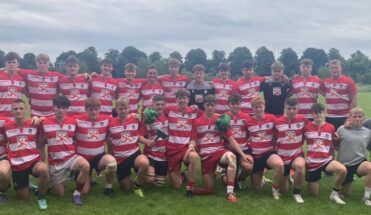
Review: U16 and U18 academy festival at Stirling RFC
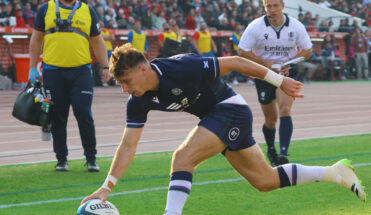

Highlights: Chile 11-52 Scotland
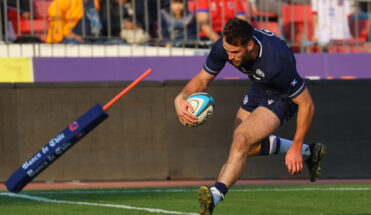
Report: Chile 11-52 Scotland
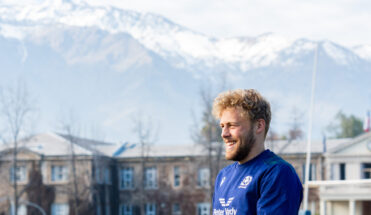
Preview: Chile v Scotland
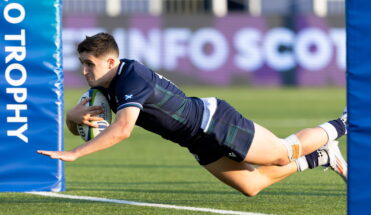

Highlights: Scotland U20 48-10 USA U20
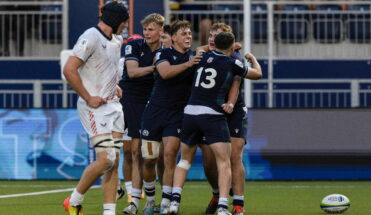
Report: Scotland Men U20 48-10 USA U20
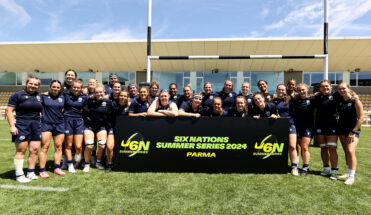

Gallery: Ireland U20 v Scotland Women U20

Match Report: Ireland U20 37 – 7 Scotland Women U20
